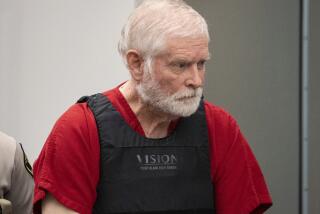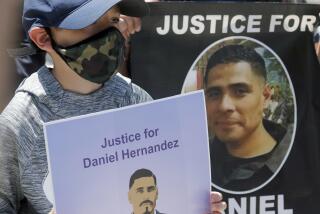Immigrant deported multiple times found not guilty in slaying of Kathryn Steinle; Trump calls verdict ‘disgraceful’
A Mexican national was acquitted of murder and manslaughter charges Thursday in the fatal shooting of Kathryn Steinle, a Bay Area woman whose slaying in 2015 became a flashpoint in the national debate over people in the U.S. illegally and the role of local police in enforcing federal immigration laws.
Jurors deliberated for several days before returning the verdict in the trial of Jose Ines Garcia Zarate, who had been deported five times and freed under sanctuary laws before the fatal shooting. They convicted him on a single count of being a felon in possession of a firearm. He has not been sentenced.
The verdict brought a swift response from President Trump, who had cited the slaying during his campaign to make his case for building a wall across the U.S.-Mexico border and to punish cities he accused of not cooperating with immigration enforcement.
“A disgraceful verdict in the Kate Steinle case!” he tweeted Thursday. “No wonder the people of our Country are so angry with Illegal Immigration.”
Reaction came quickly from other quarters as well. U.S. Atty. Gen. Jeff Sessions says he hopes the not guilty verdict will make local officials “consider carefully the harm they are doing to their citizens” by not cooperating with federal immigration officials.
And U.S. Immigration and Customs Enforcement said it will take custody of Garcia Zarate once his case concludes.
During the trial, the defense called an expert who testified that an unintentional ricochet shot killed Steinle. They argued that the weapon went off in their client’s hands in what was a tragic accident.
Garcia Zarate’s attorneys said he had found the gun, which had been stolen a few days earlier from a federal ranger’s nearby parked car.
Addressing the media outside the courtroom after the verdict, Public Defender Matt Gonzalez offered condolences to Steinle’s family.
“I hope that they do not interpret this verdict as diminishing in any way the awful tragedy that occurred that their family has suffered,” he said.
He later invoked members of the Trump administration, including the president, Vice President Mike Pence and Sessions.
“Let me just remind them that they are themselves under investigation by a special prosecutor in Washington, D.C., and they may themselves soon avail themselves of the presumption of innocence beyond a reasonable doubt standard,” Gonzalez said. “I would ask them to reflect on that before they comment or disparage the result in this case.”
Steinle was shot in the back in July 2015 as she walked with her father on San Francisco’s Pier 14, near Embarcadero and Mission streets. Less than an hour later, Garcia Zarate, a seven-time felon, was arrested about a mile away from the shooting scene.
His previous brushes with the law and release by law enforcement stoked angry arguments over so-called sanctuary cities.
“This senseless and totally preventable act of violence committed by an illegal immigrant is yet another example of why we must secure our border immediately,” Trump, a presidential candidate at the time, said in a statement two days after Steinle died. “This is an absolutely disgraceful situation, and I am the only one that can fix it.”
He told CNN that year: “This man, or this animal, that shot that wonderful, that beautiful woman in San Francisco, this guy was pushed back by Mexico. Mexico pushes back people across the border that are criminals, that are drug dealers.”
The politicization didn’t go unnoticed by Steinle’s family.
“For Donald Trump, we were just what he needed — beautiful girl, San Francisco, illegal immigrant, arrested a million times, a violent crime and yadda, yadda, yadda,” Liz Sullivan, Steinle’s mother, told the San Francisco Chronicle, according to a report published two months after the shooting. “We were the perfect storm for that man.”
After the reading of the verdict, one of Garcia Zarate’s attorneys, Francisco Ugarte, said the case had become terribly politicized.
“From Day One, this case was used as a means to foment hate, to foment division and to foment a program of mass deportation,” he said. “It was used to catapult a presidency along that philosophy of hate of others. And I believe today is a vindication for the rights of immigrants.”
In March 2015, when Garcia Zarate finished his third federal prison term for felony reentry into the United States from Mexico, he was turned over to San Francisco on a decades-old bench warrant for alleged marijuana possession. Prosecutors declined to file charges.
ICE asked to be notified prior to his release, but city officials did not comply because Garcia Zarate did not meet their criteria, set in 2013, for turning over people to immigration officials.
He was freed.
A harsh light fell on what role San Francisco’s status as a sanctuary city had in the tragedy, with several Republican presidential candidates at the time calling for the federal government to punish such municipalities.
News outlets reported that politics and the immigration debate were kept out of the courtroom during the trial. The trial hinged on whether jurors believed the killing was intentional as opposed to accidental, as the defense asserted.
The prosecutor presented evidence that the pistol that killed Steinle required a firm pull of the trigger to fire and that Garcia Zarate threw the firearm into San Francisco Bay after Steinle fell, according to the San Francisco Chronicle. A crime-scene inspector also testified that the defendant had to have aimed the gun at Steinle for the bullet to follow the path it did.
“It was a verdict we were not hoping for,” San Francisco district attorney’s spokesman Alex Bastian said. “I know that both sides fought very hard, but again, the jurors are the ones who make a determination on a case and we will respect that decision.”
Laurie Levenson, a law professor at Loyola Law School, said the verdict showed that the jury evaluated the case based on the evidence presented in the courtroom, not on the political rhetoric sounding outside.
“There’s a huge danger in us making assumptions, based upon somebody’s immigration status, as to whether they’re guilty of a serious crime like murder,” Levenson said. “That can very much undermine the important presumption or innocence and undercut what our criminal justice system is designed to do.”
In an exclusive interview with the San Francisco Chronicle, Steinle’s father, Jim Steinle, and his family shared their hope that the verdict would mark the end of their public profile.
The family did not attend court to hear the jury’s decision.
“We’re just shocked — saddened and shocked ... that’s about it,” he told the newspaper about the verdict. “There’s no other way you can coin it. Justice was rendered, but it was not served.”
Kathryn Steinle’s brother, Brad, went on to tell the newspaper that he was “stunned that they couldn’t even get him on using the weapon.”
Times staff writer Seema Mehta contributed to this report.
For more California news, follow @brittny_mejia
UPDATES:
9:25 p.m.: This article was updated with additional background information.
8:40 p.m.: This article was updated with comments from President Trump, a legal expert and Steinle’s family.
5:45 p.m.: This article was updated with comments from the defense and prosecutors.
This article was originally published at 4:45 p.m.
More to Read
Start your day right
Sign up for Essential California for news, features and recommendations from the L.A. Times and beyond in your inbox six days a week.
You may occasionally receive promotional content from the Los Angeles Times.








